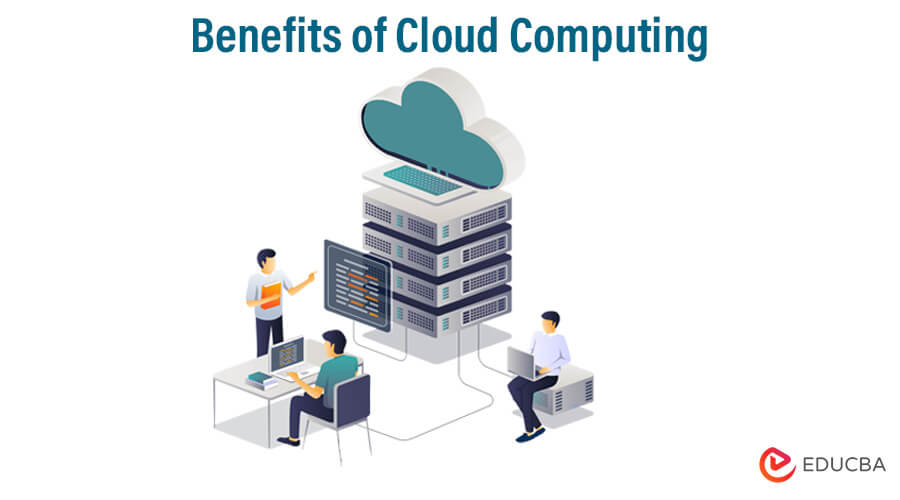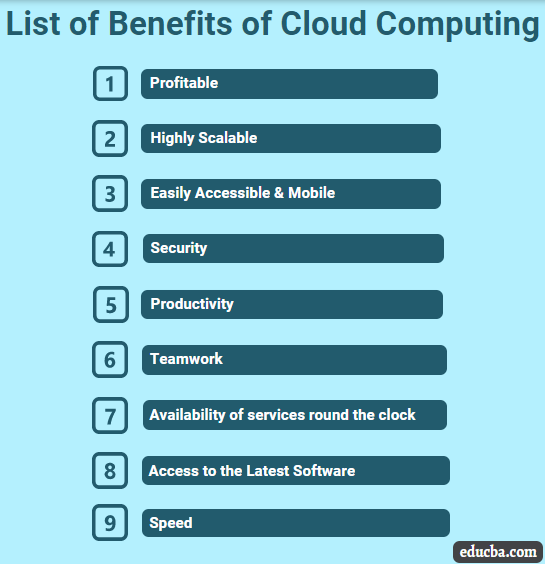Updated July 3, 2023
Introduction to Benefits of Cloud Computing
If you hold an e-mail account, specifically a Gmail account, I am sure you have used or at least heard of Google Drive. Have you ever wondered where it is located or what it is? Google Drive is like a C or D drive on your system’s hard drive. In this topic, we will learn about the Benefits of Cloud Computing.
But Google Drive isn’t exactly on your system; it’s a drive that’s accessible over the internet. So where is Google Drive, then? Well, Google Drive is in a location we call “the cloud.” Google Drive is the most popular and widely used cloud storage today.
On the other hand, the term “computing” refers to the utilization of technology to perform a task at hand.
Thus, cloud computing may be defined as utilizing various technology-provided services made available over the internet.
List of Benefits of Cloud Computing
Cloud computing has rapidly grown in the market over the years, from having 2.4 billion users in 2013 to having an estimated 3.6 billion users in 2018. The numerous benefits cloud computing has to offer are as follows:
1. Profitable
Using cloud computing proves to be highly cost-efficient as companies could all together forgo the cost of purchasing and maintaining storage drives, software, and servers on their own. Instead of using cloud-provided services such as storage or software over the internet by paying only for the services one uses and requires. This pay-on-demand system makes the whole process much more profitable on a larger scale.
2. Highly Scalable
One could easily upgrade or downgrade the required services per one’s need. For example, one might need more space for executing certain applications when compared to other applications. As per the space requirement needed to run/ execute this software, one could increase or decrease the space requirement with the service provider. One also need not worry about any version updates, which can sometimes be expensive. Cloud services have it all. All this allows us to meet client expectations without too much hassle.
3. Easily Accessible & Mobile
One of the biggest advantages clouds has to offer is their accessibility, which is being able to access it from anywhere remotely as long as one is connected to the internet. A person could make use of cloud-provided services without having to be dependent on any particular system or any geographic location as such. This allows one to work closely with the client from close proximity and with various devices readily available at hand, such as laptops, tablets, or even smartphones.
4. Security
In today’s world, securing data is a major concern among most organizations out there. Cloud puts encryption methods to use when data security is concerned. These encryptions make use of complex algorithms to encrypt and decrypt data. Furthermore, it restricts access to any unauthorized user at the base level, helping keep the server and all its contents secure. Cloud also offers a backup facility to avoid any unwanted disasters caused due to data loss. This allows users to restore data from backups may the need arise.
5. Productivity
Many organizations lose a lot of time, revenue, and productivity due to downtime in their services. Downtime in services may be caused due to security patches, version upgrades, etc. Cloud mitigates these sorts of issues for you. Thus increasing your productivity and allowing you to meet deadlines with lesser hurdles. This helps the organization and leaves a positive impact on the client.
6. Teamwork
Cloud computing makes working as a team much easier. This is because team members can now view, share and contribute across easily accessible cloud platforms. This completely removes the overhead of sending team members the latest work-related documents. One needs to communicate the location at which the documents are placed merely. This leads to better collaboration between team members. It also reduces dependency on any particular person as another person from the same team can continue the work from where his team member has left off.
7. Availability of services round the clock
It has a major impact on delivering your products to the client on time. It’s fairly common for organizations to face server downtime during security patches, upgrades for better load-balancing capabilities, or various other reasons. The cloud takes care of these things as most cloud providers maintain an uptime of 99.9%, making servers and other services available for use round the clock. This allows organizations to focus on the business deliverables without any hindrance in workflow and delay of deliverables.
8. Access to the Latest Software
Cloud providers allow one to avail of the latest software versions with ease. This plays a significant role in increasing the productivity of an organization without having to invest any time in software up-gradation. Instead, the time saved can be better utilized for designing their products, planning, and strategizing. Also, this helps avoid any version incompatibilities and releases an updated/ latest product into the market that provides all the latest features.
9. Speed
Since cloud providers provide services on-demand, getting the required amount of storage space or the latest software on the cloud is fairly faster when compared to the traditional process of purchasing a hard drive with the needed storage space or purchasing software. Most cloud providers come with self-service options, where one can choose the required services and pay. The cost is calculated based on the customer’s selection.
Conclusion
Cloud computing has bought about a huge change in how organizations operate. They have improved the entire process in a number of ways. We have seen a few of the major benefits of cloud computing.
Recommended Articles
This has been a guide to the Benefits of Cloud Computing. Here we discuss a few of the numerous and major benefits of cloud computing. You can also go through our other suggested articles to learn more –





